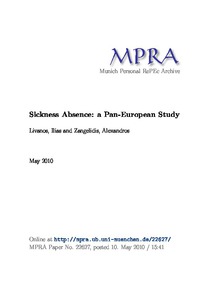Sickness absence: a pan-European study
"This study, using the EU-LFS, examines the determinants of sickness absence in 26 EU countries. The analysis highlights the importance of demographic and workplace characteristics and of institutional and societal conditions. Female workers aged 26-35 exhibit higher absenteeism, possibly refle...
| Main Authors: | , |
|---|---|
| Institution: | ETUI-European Trade Union Institute |
| Format: | TEXT |
| Language: | English |
| Published: |
Munich
2010
MPRA |
| Subjects: | |
| Online Access: | https://www.labourline.org/KENTIKA-19184694124919028769-Sickness-absence-a-pan-europea.htm |
| Summary: | "This study, using the EU-LFS, examines the determinants of sickness absence in 26 EU countries. The analysis highlights the importance of demographic and workplace characteristics and of institutional and societal conditions. Female workers aged 26-35 exhibit higher absenteeism, possibly reflecting the level of high household labour pressure. Increased job insecurity, captured by temporary contracts, and labour market uncertainty, reflected in higher unemployment rates, have a negative effect on absenteeism. Finally, individual sickness absence is lower in countries with higher proportion of dependent/out of the labour market individuals, probably because of the increasing pressure labour active people may experience." |
|---|---|
| Physical Description: | 21 p. Digital |

